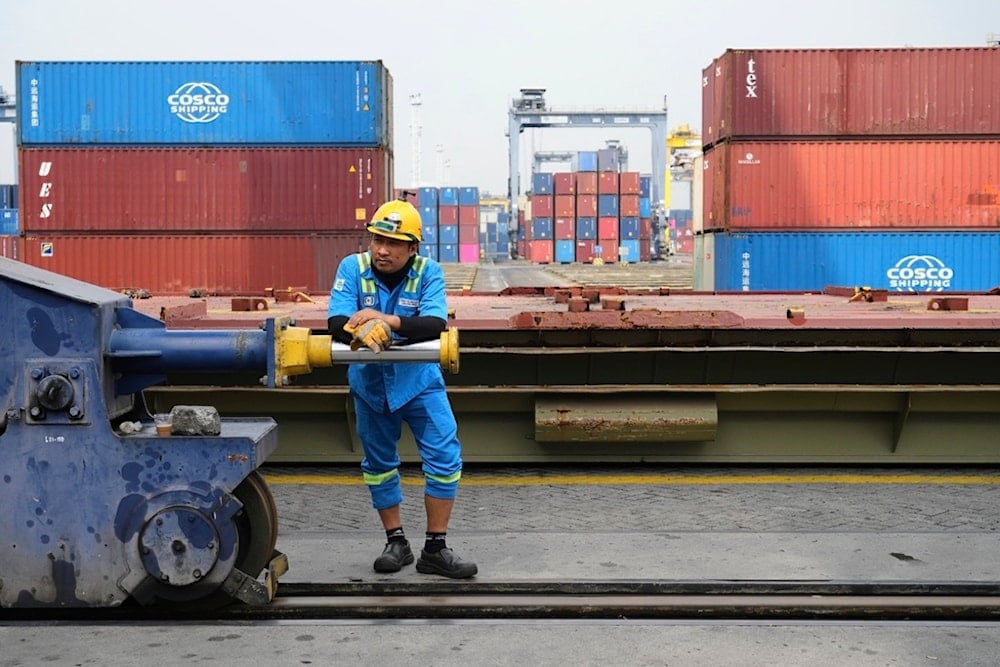Trump claims secured $20B deal, slaps 19% tariff on Indonesian imports
Trump's new trade deal with Indonesia imposes steep tariffs on Indonesian exports while granting US goods tariff-free access, prompting regional concern and a coordinated ASEAN pushback against Washington’s aggressive trade tactics.
-

A worker rests during a break as containers are stacked at Jakarta International Container Terminal (JICT) at Tanjung Priok Port in Jakarta, Indonesia, Wednesday, July 9, 2025. (AP)
US President Donald Trump has unveiled a sweeping new trade agreement with Indonesia, imposing a 19% tariff on all Indonesian exports entering the US while granting American products full tariff exemption in the Indonesian market. Framed by Trump as a major win for American industry, the deal has sparked mixed reactions both inside Indonesia and across Southeast Asia.
"It is my Great Honor to announce our Trade Agreement with the Republic of Indonesia, as represented by their Highly Respected President, Prabowo Subianto," Trump posted on Truth Social.
"It is agreed that Indonesia will be Open Market to American Industrial and Tech Products, and Agricultural Goods, by eliminating 99% of their Tariff Barriers. The United States of America will now sell American Made products to Indonesia at a Tariff Rate of ZERO, while Indonesia will pay 19% on all of their products coming into the U.S.A."
Strategic concessions
The agreement includes substantial commitments from Jakarta: Indonesia will supply critical minerals and make large-scale purchases of American goods, including approximately 50 Boeing aircraft, energy exports, and over $4.5 billion in agricultural commodities. According to Trump, the total value of these deals amounts to tens of billions of dollars.
While the Trump administration touts the agreement as a triumph of economic leverage and strategic reciprocity, Indonesia’s trade ministry has described the negotiations as a "difficult but necessary compromise". Originally facing the threat of a 32% blanket tariff, Indonesian negotiators secured a reduction to 19% and obtained expanded market access for certain export categories.
President Prabowo Subianto hailed the agreement as marking a "new era" in bilateral relations, but domestic economists have expressed concern over the long-term costs, particularly for Indonesian exporters who may face diminished competitiveness in the US market. Still, the deal was welcomed by Bank Indonesia, which cut key lending rates by 25 basis points and saw a short-term boost in market confidence.
Tariff shock
More broadly, the deal has raised alarms across ASEAN. Member states have criticized Washington’s use of unilateral tariffs as bargaining tools, fearing a precedent that could disrupt regional trade norms and erode multilateral frameworks. At a special ASEAN Economic Ministers meeting in April, several countries, led by Malaysia, Vietnam, and Thailand, called for a unified front in dealing with Washington’s trade pressure.
At the May summit in Kuala Lumpur, Malaysian Prime Minister Anwar Ibrahim proposed a dedicated ASEAN-US summit to address tariff escalation and to explore mechanisms to preserve supply chain stability. In the meantime, ASEAN has refrained from retaliatory measures, instead prioritizing diplomacy and internal economic integration to insulate member economies from further shocks.
Read more: Indonesia launches $5.9bln electric vehicle battery plant in Karawang
While Indonesia has managed to soften the immediate impact through strategic concessions, the deal reinforces the Trump administration’s broader protectionist agenda: reshaping trade flows through pressure, incentives, and transactional diplomacy. As other ASEAN nations weigh their options, the Indonesia agreement is likely to become a blueprint, and a warning, for what future trade negotiations under Trump’s second term might look like.

 3 Min Read
3 Min Read










